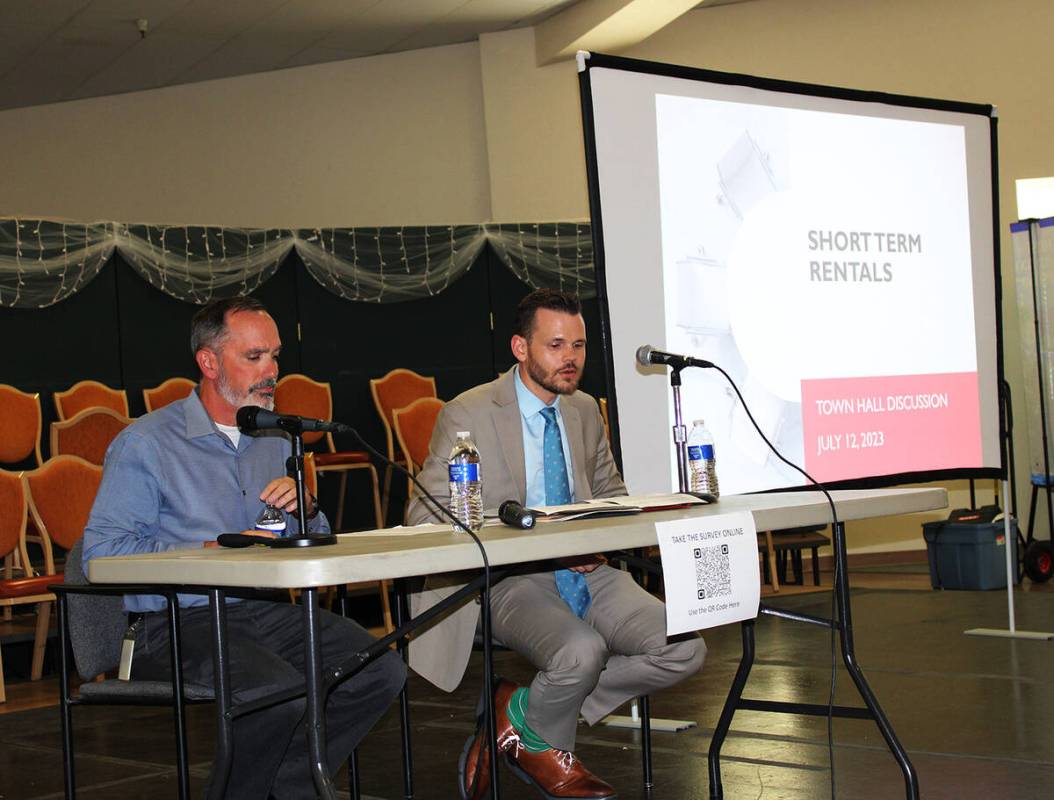
For an issue that has caused so much local uproar for more than a year, the question of whether Boulder City should formalize the informal-but-still-binding ban on short-term rentals (STR) within city limits ended with more of a whimper than a bang Tuesday as the City Council voted 4-1 to adopt text changes to city code clarifying that the practice is illegal and establishing a system of civil fines for STR owners who continue to operate.
But the bang part may yet be coming as multiple members of the public who addressed the council (most via phone calls or written comments) threatened legal action if the city moved forward on what has long appeared to be a pre-determined route.
The most overt of those veiled threats came from Jacqueline Flores, who co-founded the Greater Las Vegas Short Term Rental Association. According to their web site, the group’s mission is to “advocate for the rights of short-term rental (STR) owners in Nevada. We strive to protect their property rights while promoting the benefits that STRs bring to individual property owners, local businesses, residents, and travelers in our state. ”
Speaking via a phone call, Flores said she was, “Representing short-term rental owners in Boulder City and we are asking the council to table item 8 (the agenda item addressing STRs). We have provided council members with copies of the preliminary injunction we were granted last year by the Nevada District Court against similar plans to the ones that Boulder City is now proposing. That was ruled as unconstitutional so we are asking Boulder City’s council members to please table this item until the Nevada Supreme Court rules on this matter. This will avoid unnecessary litigation from Boulder City homeowners against the city.”
Flores said that a ruling is expected, “pretty soon. In the next two or three months,” and then added, “I think that it’s better for the city to wait instead of going after homeowners and creating further harm. People are already struggling financially. We have been encouraging the cities to allow short-term rentals so people may supplement their income. Just to remind everyone, Clark County has been trying this path for many years and has failed. It has only created issues for the county and massive lawsuits from different homeowners as well as from our association.”
Written comments were largely in support of STRs being able to continue operating with former city clerk and current Planning Commission member Lorene Krumm dissenting and calling STRs, “hotels disguised as houses.” Another written comment advocated for the issue to be put on the November ballot and suggesting that STR owners pay at least 10% of their gross monthly income to the city in taxes.
Members of the public actually in council chambers were uniformly against STRs.
Community Development Director Michael Mays stepped up to the mic to begin the formal process of a public hearing saying, “Staff is proposing amendments to Title 11 that clarify the prohibition of short-term rentals and general enforcement and declaring violations of Title 11 including the operation of short-term rentals and other prohibited home occupations as public nuisances subject to civil citations and fines as set forth in Title 8, Chapter 1 of the city code.”
Mays continued saying that, “The text amendments follow a year of public engagement on the issue of short-term rentals, which included a town hall meeting, a community survey and several public meetings.”
It was a public hearing but all of the public action took place at the beginning of the meeting.
With no one in the room waiting to say their piece, it looked like the vote might occur without any discussion by the council until Matt Fox, who was attending the meeting via telephone, piped in.
“I don’t believe we should consider this bill,” he said. “I don’t think STRs should be prohibited. I think STRs would be really good for the town. We need revenue as we are a recreation city.”
At that point, Councilmember Steve Walton started talking about the process.
“There’s a lot of details to governing in a transparent way and ensuring that the public is engaged and informed,” he said. “I think we have done everything according to the law and according to good practice. We’ve engaged the community at length and heard from them in a variety of ways. And I think that at the conclusion of this, whether you are in favor of it or not, it’s a collective sigh of, ‘At least we’ve reached the finish line of this.’ And as we have been instructed by staff and through our city attorney, we have crossed our T’s and dotted every I along the way and absolutely have followed each step and have the right as a municipality in compliance with state law to make this amendment as proposed.”
City Attorney Brittany Walker, responding to a question from Hardy after the vote, explained that once the law is effective, the city will be able to enforce the code via civil fines. If, after the effective date, someone is operating an STR and is reported, the city will conduct an investigation to see if an STR is actually operating.
“If we determine that it is,” she said, “we will send a notice of violation and let them know that they need to correct it within a certain amount of time. If they don’t correct it, they can be subject to citations and fines. If they continue to operate it, they can be subject to escalated fines. Each day that the property operates as a short-term rental is a separate violation.
Walker explained that there will be an appeals process, initially to Mays and then a second level of appeal going to the municipal judge. (Victor Miller at this time but he is retiring in early 2025.)
The law becomes effective on April 18 with a planned grace period extending to May 1.